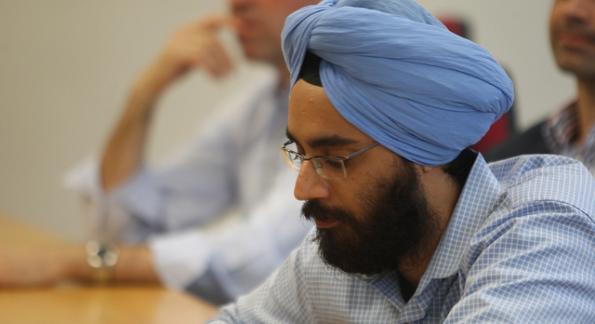
The Development Week is an international summer gathering between postgraduate students, academics and professionals specialized in Development. The first edition of this event was held in the University of Navarra on 2012 and since then it has gained in momentum and in international participation.
The 2nd Development Week was held in Pamplona at the University of Navarra on June 3-7, 2013. This event offered a course in the Causes and Consequences of Civil Conflict, analyzing its effects on growth, investment and the economies where it takes place. In addition, internationally recognized experts in their respective fields gabe a variety of seminars. The Keynote Speech was given by Oded Stark and addressed the relation between globalization and social distress.
Prof. Prakarsh Singh, from Amherst College, gave an interview to the university magazine Nuestro Tiempo discussing his course at the II Navarra Development Week.
P. Could you briefly explain the content of your upcoming course in the D-Week?
R. The course will first delve into the theory that tries to explain why wars happen. Then, we will study empirical regularities across countries that have been affected by conflict. The second half of the course will deal with economic consequences of wars on growth and investment. Finally, the course will discuss the latest research on microeconomic consequences of conflict on individuals, families and firms. To sum up, we will be reviewing the economics literature (both classic and recent working papers) on the causes and consequences of civil wars.
P. Why is conflict such a central topic in development studies?
R. It is increasingly becoming an important topic in development economics. Although it was largely ignored before 2000, better data, methods and theory have catapulted the field into mainstream and also given economists much greater insight into the assumptions that we normally take for granted, for instance, property rights.
P. To what extent does poverty induce conflict? Or does the relation work in the opposite way?
R. Conflict and poverty are both closely related. The course will delve into methods and papers that have tried to get at both causal relationships and also the channels. A decline in economic growth increases the probability of conflict and conflict in turn reduces incomes through adverse effects on physical and human capital.
P. Which are the main findings of your research on conflict?
R. My findings are in the domain of causes and consequences of civil conflict. In particular, I have studied why half-hearted attempts at democratizing may lead to civil wars and the effects of violence on investment, labor markets, education, gender inequality and food prices.
P. As a past speaker, why would you recommend a student to come to the Development week?
R. I would recommend a student to come to Development week because of 3 main reasons:
First, it gives an opportunity for the student to interact with professors who have been doing work in a specialized area and learn from them the frontier of research.
Second, learning from students from outside, making new friends and possibly working on research together in the future.
Third, outside-class informal interactions that gives the students the chance to ask questions about mechanics of collecting data and building models.






